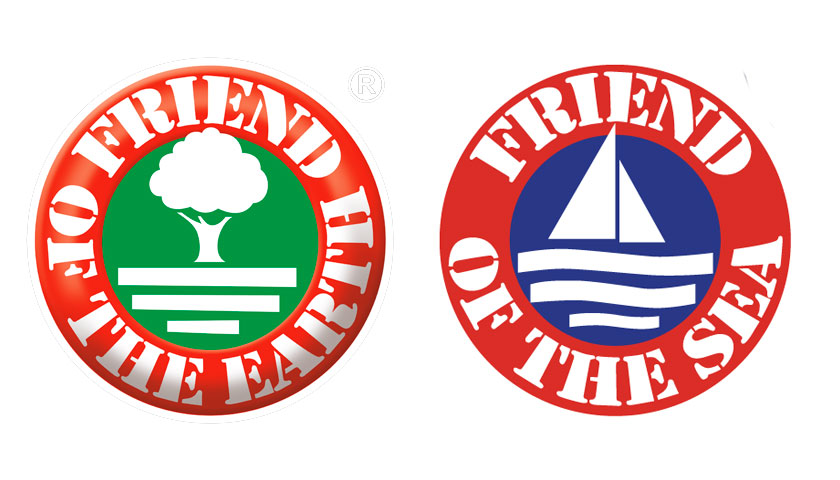The World Sustainability Organization (WSO) the preeminent certification standard for products and services that respect and protect the environment, today announced the start of an outreach campaign in the UK. The WSO operates Friend of the Sea (FOS) and Friend of the Earth (FOE), which certify seafood and agriculture products, respectively, for sustainable practices. After passing a strict audit, British companies that meet the criteria for certification, can display the Friend of the Earth or Friend of the Sea eco-label on their products. Over 900 companies in 70 countries have products FOS or FOE certified products.
“We are truly at a turning point, worldwide, in terms of consumer awareness of sustainability as it affects the food they eat,” said Paolo Bray, Director of Friend of the Sea. “There is sincere interest among consumers, who are showing, with their spending, that they will reward brands that take the environment said. Now, food producers in [country] can avail themselves of this growth opportunity that also happens to benefit the planet we all share.”
The challenge, according to Bray, is one of brand credibility. “Rising consciousness aside, people may be skeptical about the inflation of sustainability self-claims and green washing. The World Sustainability Organization now provides a way for consumers to immediately spot and be able to choose products and services respecting the marine environment or land habitat.”
WSO offers a third-party, nationally-accredited sustainability certification to reassure consumers that a given product is verified according to strict sustainability requirements. “We offer a credible and effective way for farmers, food companies and seafood producers to demonstrate their commitment to sustainable management practices,” Bray added.
To achieve FOS or FOE certification, a product must comply with clear standards by passing a rigorous, independent third-party audit. The audit process involves consultation with stakeholders, an onsite audit and continuous yearly recertifications. The company must demonstrate a commitment to preservation and protection of the ecosystem. This includes breeding and fishery management practices. Chemicals used in the production process must meet sustainability criteria. Energy use, waste management, regulatory compliance, chain of custody and corporate social responsibility are also evaluated by the auditor.
FOS and FOE certifications can also be granted for other products and services which could have a potential impact on the marine habitat and the environment. Examples include UV creams as well as cosmetics and nutritional products featuring Omega-3 fish oil. Cruise ship lines, restaurants and aquaria are also eligible for certification.
The WSO has, over the years, supported and developed conservation projects and campaigns to protect endangered species, like sturgeon, albatross, dolphins, whales, sharks, coral reefs, snails and butterflies. “Companies and consumers relying on Friend of the Sea and Friend of the Earth certifications can this way support conservation when choosing certified products.
Friend of the Earth
The WSO’s overall goal is the conservation of ecosystems. In the case of Friend of the Earth, realizing this goal involves certifying that agribusiness concerns are preserving and conserving zootechnical biodiversity and genetic heritage. The objective is to favor a close bond between animal and territory. The audit also looks at the enhancement of closed-cycle breeding and feed production that adhere to EU principles of organic farming—ensuring the absence or drastic reduction in the use of chemicals. Other criteria include open-air framing with reduced load density, recovery of animal manure, respect for animal welfare and social responsibility.
Friend of the Sea
Friend of the Sea follows a comparable certification protocol to Friend of the Sea, but focuses on sustainability in the marine environment. It audits fishing businesses, seafood processors, fish farming facilities and producers of seafood-derived products like omega 3 fish oils. Friend of the Sea promotes pilot projects related to restaurants, sustainable shipping, whale and dolphin-watching, aquaria, ornamental fish, UV creams and others.
Confronting a Serious Global Issue
WSO is addressing the consequences of the world’s population growth, which has generated an exponential growth in the demand for food. This growth has had significant impacts on the environment. “Unsustainable agricultural production practices have resulted in very serious damage to both the land and the sea,” Bray noted. “What we have to consider, like it or not, is what the concept of ‘unsustainable’ really means. Unsustainable food production means we will start running out of food. It’s that simple, and that serious. We have to do the work now to avoid this very serious potentiality.”
